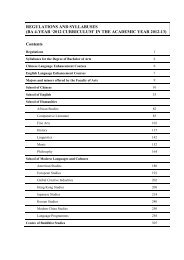Bachelor of Arts (BA) - The University of Hong Kong
Bachelor of Arts (BA) - The University of Hong Kong
Bachelor of Arts (BA) - The University of Hong Kong
Create successful ePaper yourself
Turn your PDF publications into a flip-book with our unique Google optimized e-Paper software.
Students may opt to be assessed on their use <strong>of</strong> information technology in this course, in order to fulfilthe IT requirement specified in Regulation UG3, unless they fulfil this requirement elsewhere. Thosetaking this option will undertake some extra work in IT and will earn an additional 3 credits, listed onthe transcript under PHIL1007. Using information technology in Philosophy (though this is not aseparate course). <strong>The</strong> mode <strong>of</strong> assessment for this component will be 100% coursework.277PHIL1002.<strong>The</strong> human mind: an introduction to philosophy (6 credits)(This course is also <strong>of</strong>fered to first year non-<strong>BA</strong> students for inter-Faculty broadening purposes.)This course is an introduction to philosophical issues about the mind. <strong>The</strong>se include metaphysicalquestions about what minds are, whether the mind is something non-physical or whether it is some kind<strong>of</strong> a computer. <strong>The</strong>n there are the epistemological questions about the limitation <strong>of</strong> human knowledge,such as whether we can really know what other people's experiences are like, or whether there is a God.Assessment: 100% coursework (may include in-class test).PHIL1003.Ethics and politics: an introduction to philosophy (6 credits)(This course is also <strong>of</strong>fered to first year non-<strong>BA</strong> students for inter-Faculty broadening purposes.)One <strong>of</strong> the founders <strong>of</strong> Western philosophy, Socrates, claimed that the most important philosophicalquestion is “How is one to live?” How are we to live in our relations with others as individuals (ethics)?And how are we to live together as communities and societies (politics)? This course will introducesome <strong>of</strong> the ways that key philosophers in the Western tradition have answered these questions.Reading texts by Plato and Aristotle in ancient Greece, and modern and contemporary writings byRousseau, Kant, Mill, Rawls and contemporary feminists, we will explore questions about the way werelate to other people.Assessment: 100% coursework (may include in-class test).PHIL1004.Chinese and western thought: an introduction to philosophy (6 credits)(This course is also <strong>of</strong>fered to first year non-<strong>BA</strong> students for inter-Faculty broadening purposes.)<strong>The</strong> course compares central themes in the philosophical dialogues <strong>of</strong> the Chinese and Westerntraditions. Topics may include Confucian intuition, Daoist paradox, Greek rationalism, BritishEmpiricism, Existentialism, Pragmatism, Maoism, Zen Buddhism, and positivism.Assessment: 100% coursework (may include in-class test).Students may opt to be assessed on their use <strong>of</strong> information technology in this course, in order to fulfilthe IT requirement specified in Regulation UG3, unless they fulfil this requirement elsewhere. Thosetaking this option will undertake some extra work in IT and will earn an additional 3 credits, listed onthe transcript under PHIL1007. Using information technology in Philosophy (though this is not aseparate course). <strong>The</strong> mode <strong>of</strong> assessment for this component will be 100% coursework.PHIL1005.Critical thinking and logic (6 credits)(This course is also <strong>of</strong>fered to non-<strong>BA</strong> students for inter-Faculty broadening purposes.)Critical thinking is a matter <strong>of</strong> thinking clearly and rationally. It is important for solving problems,effective planning, and expressing ideas clearly and systematically. We shall study the basic principles<strong>of</strong> critical thinking, and see show how they can be applied in everyday life.Assessment: 60% coursework, 40% final exam.
















